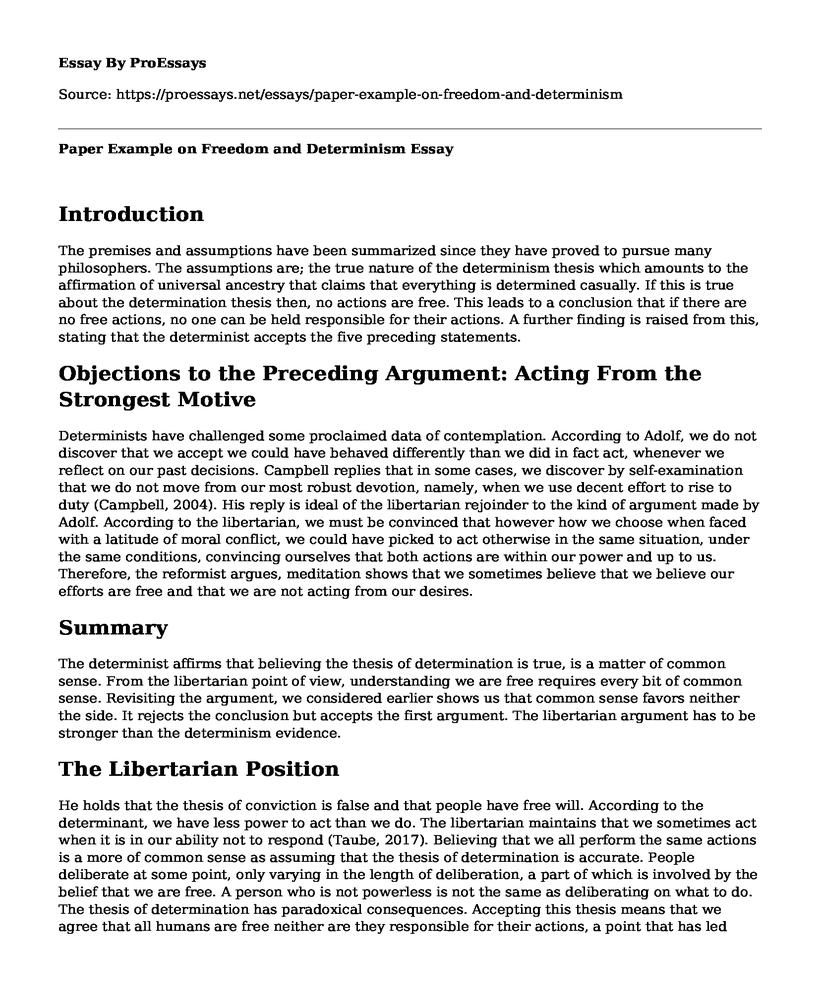Introduction
The premises and assumptions have been summarized since they have proved to pursue many philosophers. The assumptions are; the true nature of the determinism thesis which amounts to the affirmation of universal ancestry that claims that everything is determined casually. If this is true about the determination thesis then, no actions are free. This leads to a conclusion that if there are no free actions, no one can be held responsible for their actions. A further finding is raised from this, stating that the determinist accepts the five preceding statements.
Objections to the Preceding Argument: Acting From the Strongest Motive
Determinists have challenged some proclaimed data of contemplation. According to Adolf, we do not discover that we accept we could have behaved differently than we did in fact act, whenever we reflect on our past decisions. Campbell replies that in some cases, we discover by self-examination that we do not move from our most robust devotion, namely, when we use decent effort to rise to duty (Campbell, 2004). His reply is ideal of the libertarian rejoinder to the kind of argument made by Adolf. According to the libertarian, we must be convinced that however how we choose when faced with a latitude of moral conflict, we could have picked to act otherwise in the same situation, under the same conditions, convincing ourselves that both actions are within our power and up to us. Therefore, the reformist argues, meditation shows that we sometimes believe that we believe our efforts are free and that we are not acting from our desires.
Summary
The determinist affirms that believing the thesis of determination is true, is a matter of common sense. From the libertarian point of view, understanding we are free requires every bit of common sense. Revisiting the argument, we considered earlier shows us that common sense favors neither the side. It rejects the conclusion but accepts the first argument. The libertarian argument has to be stronger than the determinism evidence.
The Libertarian Position
He holds that the thesis of conviction is false and that people have free will. According to the determinant, we have less power to act than we do. The libertarian maintains that we sometimes act when it is in our ability not to respond (Taube, 2017). Believing that we all perform the same actions is a more of common sense as assuming that the thesis of determination is accurate. People deliberate at some point, only varying in the length of deliberation, a part of which is involved by the belief that we are free. A person who is not powerless is not the same as deliberating on what to do. The thesis of determination has paradoxical consequences. Accepting this thesis means that we agree that all humans are free neither are they responsible for their actions, a point that has led people to social activism.
The Nature of the Problem
There's ambiguity like determinism and freedom. When two reasonably apparent assumptions lead to inconsistent results, a paradox arises. It is through determinism that the thesis of all universal causation is formed. We all believe that the argument of determination is true and that everything happening has a course (Thorp, 2017). Causes are difficult to find, but it does not mean that they do not exist. A person might seek a cause of anything they wonder about and pay attention to. Believing that determinism is true is reasonable. After thinking it over carefully, it is a thesis that we continue to believe. If the hypothesis of determinism is a consequence of a person's actions that are inevitable of causal processes which started before they were born, then anything a person does could not have been done otherwise. His actions are beyond his influence.
References
Campbell, J. K., O'Rourke, M., & Shier, D. (Eds.). (2004). Freedom and determinism. MIT Press.
Taube, M. (2017). Causation, Freedom, and Determinism: An Attempt to Solve the Causal Problem through a Study of its Origins in Seventeenth-Century Philosophy. Routledge.
Thorp, J. (2017). Free will: A defence against neurophysiological determinism. Routledge.
Cite this page
Paper Example on Freedom and Determinism. (2022, Jul 11). Retrieved from https://proessays.net/essays/paper-example-on-freedom-and-determinism
If you are the original author of this essay and no longer wish to have it published on the ProEssays website, please click below to request its removal:
- Why Is It Important for Instructors and Leaders to Be Ethically Sound - Essay Sample
- Paper Example on Gettier's Problem
- Ethical Business Dilemma Essay Example
- Plato's Idea on Ethics and Politics Essay Example
- Macbeth: Tragedy of Fate & Character - Literary Analysis Essay
- Annotated Bibliography on Understanding Human Nature: A Guide to Effective Workplace Relations
- Mackie's Argument on Queerness & Internalism - Essay Sample







